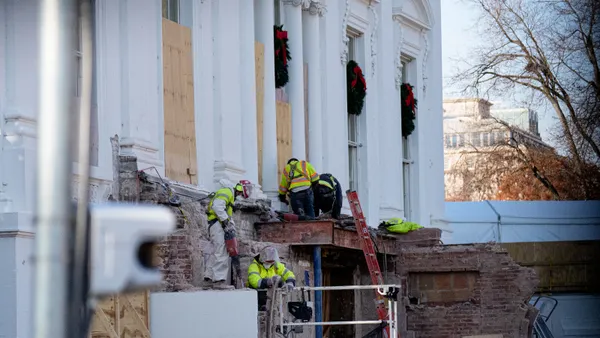Dive Brief:
- President Donald Trump has instructed Commerce Secretary Wilbur Ross to give "targeted relief" from steel quotas to South Korea, Argentina and Brazil, in addition to quota exemption for Argentinian aluminum.
- The new policy also sets up the same case-by-case application process for quota exemptions as the Commerce Department has in place for tariff exemption requests; a group that is granted a quota exclusion does not have to pay the tariff. Steel orders placed before the tariffs went into effect that exceed quotas can be brought to the U.S. under the new exclusion rule, once approved, but are still subject to the 25% steel tariff.
- In March, when Trump first imposed steel and aluminum tariffs, quotas were placed instead on steel imports from South Korea, Argentina and Brazil and on aluminum imports from Argentina. There has been no tariff relief announcement for U.S. allies like Canada, which, along with the European Union, China and Mexico, have imposed tariffs on American-made goods in retaliation.
Dive Insight:
According to Markets Insider, the quota exclusion news drove U.S. steel manufacturers' stock prices down Thursday, with the stocks of U.S. Steel (-6%), AK Steel (-4%) and Steel Dynamics (-2%) all taking a hit.
However, the Trump administration most certainly weighed that possibility against the fallout from some reported material supply shortages and growing complaints about the complex, product-based tariff exemption application process. In July, a Commerce Department official said the department had approved 267 exemption requests and denied 452. That left more than 26,000 applications submitted but not yet reviewed.
One of the companies denied a tariff exemption was Plains All American Pipeline. In its application, Plains said there were only three steel manufacturers in the world that could supply the steel it needs to construct the $1.2 billion, 550-mile Cactus II pipeline from West Texas to the U.S. Gulf Coast and that they are all located outside of America. Berg Steel Pipe, based in Panama City, Florida, opposed the exemption request and said it could supply the project with the appropriate pipe, even though it did not meet Plains' process specifications.
The Independent Petroleum Association of America is pushing for changes to the exemption application process to make it more streamlined and less confusing. The association said the application submissions should be easier to complete, that sensitive business information should be protected and that once a product qualifies, the Commerce Department should issue a "blanket exclusion" so that other companies don't have to make the same request.













